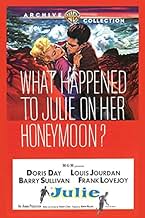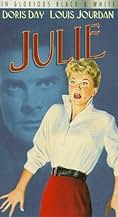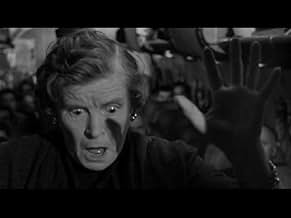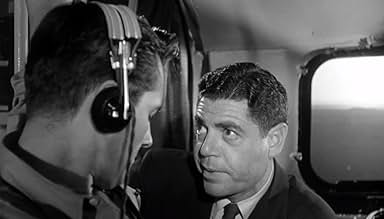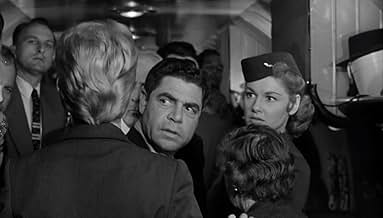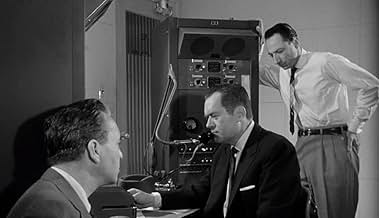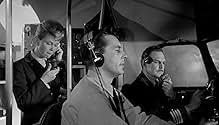IMDb-BEWERTUNG
6,2/10
2317
IHRE BEWERTUNG
Füge eine Handlung in deiner Sprache hinzuA terrified wife tries to escape from her insanely jealous husband who is bent on killing her.A terrified wife tries to escape from her insanely jealous husband who is bent on killing her.A terrified wife tries to escape from her insanely jealous husband who is bent on killing her.
- Für 2 Oscars nominiert
- 2 Nominierungen insgesamt
Pamela Duncan
- Peggy Davis
- (Nicht genannt)
Empfohlene Bewertungen
Most comedy movies could only hope to be this amusing. An airy, drippy title song plays, setting up the audience for some sort of romantic drama. No such luck. Immediately (and hilariously at odds with the opening music), Day comes running on, desperately trying to avoid her husband (Jourdon), who has apparently made a scene over her attention to another man. She hops in her car and he joins her. Even though the road is almost perfectly straight, Day spins the hell out of her steering wheel, furiously wielding it back and forth on a straight road! This overwrought and overheated beginning is merely a prelude for the wildly illogical and melodramatic story that follows. Jourdon turns out to be a crazed, obsessive danger to Day and the film involves her repeated attempts to get away from him before he kills her. Ms. Day is a delightful screen presence and is certainly capable, in the right hands, of delivering a terrific dramatic performance (i.e.--Hitchcock's "The Man Who Knew Too Much".) Here, however, she is up against a heinous script (astonishingly nominated for an Oscar!) and contrived, silly situations which make her look foolish. Worst of all is her (hysterically funny) series of dramatic voice-overs. The production feels the need to have her breathlessly describe all her feelings and state what is clearly happening on screen! The wording is often fall down funny and her despairing delivery paired with the stark visuals pair up to create several moments of screaming laughter. One scene has her "desperately" trying to get away from Jourdon, but she still manages to pack her favorite outfits and even seemingly make sure she selects the right purse to go with her shoes. Another has her running from him in a snug skirt until she falls on a big rock and lays there. The whole movie is filmed with a crisp, clinical detachment since this was a bold new subject and all the happenings were so bleak and gripping. This makes for some really dry viewing today, especially when the (inept) police do their thing and during the climax when realistic (but uninteresting) air traffic controllers communicate with Day. Day, a stewardess, gets a breather midway through to scramble some eggs and sashay around in a kicky one piece lounge suit (and act as if nothing is wrong with her life!) In this section, the demure, twice-married character even refuses to come out and meet a gentleman her makeshift roomie is dating because she's not dressed (even though her full-length nightgown comes down to her knuckles and almost reaches her ears! Yes... women just didn't DO that, but it's still amusing!) Stay tuned for the really kooky climax in which she and one other stewardess work a flight in which Day doesn't even realize that Jourdon in ON board! (Like a person wouldn't immediately pick out someone who they know is out to kill them!) Situations eventually warrant that Day has to fly and land the plane herself (Karen Black fans will be disappointed to learn that she wasn't the first woman in this predicament. Cross-eyed Black did it in "Airport 1975", but Day beat her by 19 years....and she flies a significant portion of the trip with her eyes CLOSED!! Notably, with regards to sexism, little had changed in those two decades, for the men call Day "honey" the whole time while in Black's case, they continuously called her "honey" and "baby"...) So many other ripe moments have been left out, but in any case, the film is a scream. Jourdon is indeed surprisingly menacing and Day tries very hard (and found the filming very difficult in real life.) Also fun is a glimpse at how dressy and glamorous airports used to be and how much air travel has changed. Don't miss the amateur actress playing an apartment resident who, when asked about Day's character, pronounces "Julie" as "Julah".
In 1956 Doris Day was cast in Julie between two of her best pieces of work, the highly dramatic Alfred Hitchcock thriller The Man Who Knew Too Much and her best musical The Pajama Game. Usually those two films are either or both listed on Doris Day's top ten. Julie never is.
There was nothing new by 1956 in leading ladies marrying psychopaths, Ingrid Bergman had done it twice already in Rage In Heaven and in Gaslight. But both of those films were intelligently done while Julie goes into the hysterically melodramatic.
Doris is cast in the title role in Julie as a woman with an obsessively jealous second husband in Louis Jourdan. Louis married Doris after her first husband committed suicide and about all there is to recommend him is that he's a great concert pianist. But after another pathological outbreak Day seeks some solace with an old friend in Barry Sullivan. And she's determined to leave Jourdan and give him the slip.
But Jourdan is one grimly determined psychotic. When she returns to her old job as an airline stewardess, Jourdan stalks her and ends up on her first airline job. After that things get real interesting over 15,000 feet.
Julie actually won two Academy Award nominations, the first for original screenplay. Impossible for me to believe but as Casey Stengel used to say in baseball, you can look it up.
The second Oscar nomination was for Best Original Song. That year Doris came out a winner of sorts because while the title song Julie didn't win Doris came home a winner with Que Sera Sera, a much better song from a much better film.
The over the top melodramatics throughout the film made what could have been a spine tingling climax into something quite camp and quite laughable. I won't reveal what the midair climax is, but just to say that it could have worked under different circumstances.
There was nothing new by 1956 in leading ladies marrying psychopaths, Ingrid Bergman had done it twice already in Rage In Heaven and in Gaslight. But both of those films were intelligently done while Julie goes into the hysterically melodramatic.
Doris is cast in the title role in Julie as a woman with an obsessively jealous second husband in Louis Jourdan. Louis married Doris after her first husband committed suicide and about all there is to recommend him is that he's a great concert pianist. But after another pathological outbreak Day seeks some solace with an old friend in Barry Sullivan. And she's determined to leave Jourdan and give him the slip.
But Jourdan is one grimly determined psychotic. When she returns to her old job as an airline stewardess, Jourdan stalks her and ends up on her first airline job. After that things get real interesting over 15,000 feet.
Julie actually won two Academy Award nominations, the first for original screenplay. Impossible for me to believe but as Casey Stengel used to say in baseball, you can look it up.
The second Oscar nomination was for Best Original Song. That year Doris came out a winner of sorts because while the title song Julie didn't win Doris came home a winner with Que Sera Sera, a much better song from a much better film.
The over the top melodramatics throughout the film made what could have been a spine tingling climax into something quite camp and quite laughable. I won't reveal what the midair climax is, but just to say that it could have worked under different circumstances.
The writer-director (and producer of many other films, although not this one) Andrew L. Stone was only nominated once for an Academy Award for Best Screenplay, and he was very proud of this one. I worked for Stone in the mid-1970's, and he looked back at "JULIE" as a piece of his finest work.
The maniacal husband-as-stalker was a new kind of character for films in 1956. The honest discussion of how law enforcement often failed 'women in jeopardy' brought up issues which only became widely discussed in the 1970's.
Doris Day plays the role of a terrorized wife trying to escape from the husband who is trying to kill her, and this is such a well-done treatment of the subject that even jaded audiences today respond to it.
The climactic scene in which Doris Day lands the passenger plane with help from the control tower is riveting, because it is based on fact. Andrew L. Stone was an exhaustive researcher, and you can be sure every detail of that scene was checked and re-checked. It would have happened in real life just as you see it on the screen.
Stone kept a collection of 'true crime' magazines dating from the 1930's in his office library, and he had dozens of plot ideas for thrillers like this one. However, he had always been his own boss and not a 'studio man'. Hollywood didn't give him big budgets, and he never had the opportunity to continue his career as Hitchcock did. Mentally sharp through his 80's, Stone spent the last decade of his life trying to put deals together to make movies that never got off the ground. Our loss.
The maniacal husband-as-stalker was a new kind of character for films in 1956. The honest discussion of how law enforcement often failed 'women in jeopardy' brought up issues which only became widely discussed in the 1970's.
Doris Day plays the role of a terrorized wife trying to escape from the husband who is trying to kill her, and this is such a well-done treatment of the subject that even jaded audiences today respond to it.
The climactic scene in which Doris Day lands the passenger plane with help from the control tower is riveting, because it is based on fact. Andrew L. Stone was an exhaustive researcher, and you can be sure every detail of that scene was checked and re-checked. It would have happened in real life just as you see it on the screen.
Stone kept a collection of 'true crime' magazines dating from the 1930's in his office library, and he had dozens of plot ideas for thrillers like this one. However, he had always been his own boss and not a 'studio man'. Hollywood didn't give him big budgets, and he never had the opportunity to continue his career as Hitchcock did. Mentally sharp through his 80's, Stone spent the last decade of his life trying to put deals together to make movies that never got off the ground. Our loss.
Doris Day had a few "damsel in distress" roles in her movies, but none requiring her to be quite as stressed out as "Julie". Trouble is the film is a bit too overwrought for comfort with Miss Day being pursued throughout by a maniacal husband (Louis Jourdan) whose only problem is he loves her to death--literally!! And not a single supporting character to give us a few laughs.
The last half-hour aboard an airliner where her husband has managed to become one of the passengers, is the best part of this neat little suspenser. Although all the usual cliches are present in the script, the terrified Doris manages to look convincingly cool and confident as she handles the controls of the airliner for the story's somewhat pat climax.
Louis Jourdan makes the husband look like a really jealous and possessive heel, aside from being a maniac--and since Doris Day reveals in her autobiography that she married a couple of these early on in her career--perhaps that helped her give a very credible performance. Not that she was any slouch in the acting department on a few of her other "damsel in distress" roles--STORM WARNING, THE MAN WHO KNEW TOO MUCH and LOVE ME OR LEAVE ME. Let's forget the phony, overly fabricated MIDNIGHT LACE. Here she gives a strong and sincere performance as a terrified woman.
Barry Sullivan gives excellent support as a friend who tries to help her when the police admit they can't do anything. Frank Lovejoy is also fine as a detective.
I can't say much for the title tune, "Julie", heard only during the credits and then quickly forgotten by me. To my surprise, it was nominated for a Best Song Oscar--so what do I know??
If you're a Doris Day fan, you'll find this suspenseful even though it takes itself much too seriously. There's not a hint of humor throughout the entire proceedings, not a single moment of relief. It's all very, very intense, whereas some humor would have helped.
Of course, there are always those who will laugh at the plot itself. It is, after all, a bit unbelievable by the time stewardess Day takes over the controls. It's to her credit that she makes it look real.
The last half-hour aboard an airliner where her husband has managed to become one of the passengers, is the best part of this neat little suspenser. Although all the usual cliches are present in the script, the terrified Doris manages to look convincingly cool and confident as she handles the controls of the airliner for the story's somewhat pat climax.
Louis Jourdan makes the husband look like a really jealous and possessive heel, aside from being a maniac--and since Doris Day reveals in her autobiography that she married a couple of these early on in her career--perhaps that helped her give a very credible performance. Not that she was any slouch in the acting department on a few of her other "damsel in distress" roles--STORM WARNING, THE MAN WHO KNEW TOO MUCH and LOVE ME OR LEAVE ME. Let's forget the phony, overly fabricated MIDNIGHT LACE. Here she gives a strong and sincere performance as a terrified woman.
Barry Sullivan gives excellent support as a friend who tries to help her when the police admit they can't do anything. Frank Lovejoy is also fine as a detective.
I can't say much for the title tune, "Julie", heard only during the credits and then quickly forgotten by me. To my surprise, it was nominated for a Best Song Oscar--so what do I know??
If you're a Doris Day fan, you'll find this suspenseful even though it takes itself much too seriously. There's not a hint of humor throughout the entire proceedings, not a single moment of relief. It's all very, very intense, whereas some humor would have helped.
Of course, there are always those who will laugh at the plot itself. It is, after all, a bit unbelievable by the time stewardess Day takes over the controls. It's to her credit that she makes it look real.
Having just finished "The Man Who Knew Too Much" for Alfred Hitchcock,
Doris Day repeats the genre and does a wonderful job in a suspence drama. The story flowed well, and Miss Day's performance was outstanding. ( She even smokes !! ) Too bad She never got to do a second film with The Master of Suspence. That is the only thing that could have improved this movie. It has a lot of the feel of Suspision, and the edgeness of Midnight Lace. Both fine films of Hitchcock and Day respectivly. Highly recommended for a good rainy afternoon.
Doris Day repeats the genre and does a wonderful job in a suspence drama. The story flowed well, and Miss Day's performance was outstanding. ( She even smokes !! ) Too bad She never got to do a second film with The Master of Suspence. That is the only thing that could have improved this movie. It has a lot of the feel of Suspision, and the edgeness of Midnight Lace. Both fine films of Hitchcock and Day respectivly. Highly recommended for a good rainy afternoon.
Wusstest du schon
- WissenswertesDoris Day has written that her close friendship with co-star Louis Jourdan angered her jealous producer husband Martin Melcher, mirroring the character relationships in the film.
- PatzerIn the opening scene, Julie is constantly turning the steering wheel, even when the rear projection shows the car to be moving in a straight line.
- Zitate
Julie Benton: Sergeant, I want to report a murder!
- VerbindungenEdited into The Green Fog (2017)
- SoundtracksMidnight On The Cliff
Composed and Performed by Leonard Pennario
Orchestrated by Lucien Cailliet (uncredited)
Top-Auswahl
Melde dich zum Bewerten an und greife auf die Watchlist für personalisierte Empfehlungen zu.
- How long is Julie?Powered by Alexa
Details
Box Office
- Budget
- 785.000 $ (geschätzt)
- Laufzeit1 Stunde 39 Minuten
- Farbe
Zu dieser Seite beitragen
Bearbeitung vorschlagen oder fehlenden Inhalt hinzufügen

Oberste Lücke
By what name was Mord in den Wolken (1956) officially released in India in English?
Antwort

